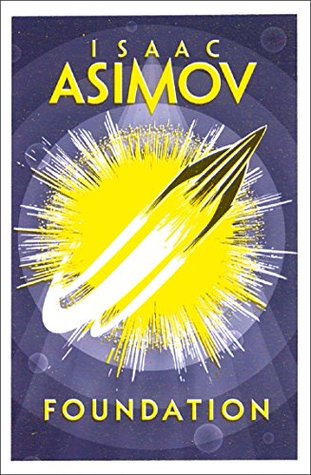Just as the Roman Empire declined, the Galactic Empire is facing its own obsolescence after more than twelve thousand years. Beyond that humanity faces a new Dark Age spanning thirty thousand years. This is the conclusion of Hari Seldon, using ‘psychohistory’, analytical predictions using mathematics, economics, psychology, and more. However, his model can offset that looming period, reducing it to a mere millennium. The solution? Create an encyclopaedia for future generations to relearn knowledge.
…if we prepare a giant summary of all knowledge, it will never be lost. Coming generations will build on it., and will not have to rediscover it for themselves. One millennium will do the work of thirty thousand.
This is the launchpad for Isaac Asimov’s Foundation series, a trilogy of novels that, in 1966, were recognised as the ‘Best All-Time Series‘ by the Hugo Awards, beating other cult-like works, such as Tolkien’s The Lord of the Rings. That series would be added to later, in the 1980s, with prequels and sequels. Though billed as a novel, the 1951 opener, Foundation, is actually a collection of five short stories, four published in a magazine between 1942-44, with the fifth bundled for publication.
The aforementioned Seldon founds a city on Terminus, a planet on the edge of its empire. Built on science and populated by scientists, so begins the work of the Galactic Encyclopaedia. Of course it’s a subterfuge for something grander, known only to Seldon himself. The concept is massive, dealing with the evolving nature of politics and economics across the galaxy as the Empire crumbles.
How the mighty had fallen! Kingdoms! They were prefects in in the old days, all part of the same province, which in turn had been part of a sector, which in turn had been part of a quadrant, which in turn had been part of the all-embracing Galactic Empire. And now that the Empire had lost control over the far reaches of the Galaxy, these little splinter groups of planets became kingdoms — with comic-opera kings and nobles, and petty, meaningless wars, and a life that went on pathetically among the ruins.
Each short story moves the destiny of the Foundation forward, jumping decades at a time until moments when a ‘Seldon Crisis’ looms, a time when the future of the Foundation faces being thrown off track from Seldon’s predictions. It’s a neat trick, offering glimpses into the evolution of society. While characters are inconsequential in the grander scheme, some have pivotal moments that affect history, and its on these that the stories hone in.
But where Asimov exudes ambition, his delivery falls painfully flat. The characters are barely defined, little more than mouthpieces for explaining political, religious, and economic strategy with regards to the civilisation. They can save the day, but they can’t save the narrative. It’s stultifyingly bad in this aspect, for there’s no pace or excitement to carry the scenes along. No drama, little threat. Just explication. Plus, the fragmented nature of the stories’ original publishing sees ‘the-story-so-far’ exposition casually dropped into conversation, which may have worked separately but becomes frustrating in something presented this time out as a novel.
This is a shame as Foundation starts well. The first story, The Psychohistorians, is its most engaging; a zippy introduction to its world (well, galaxy) by way of Gaal Dornick (“just a country boy who had never seen Trantor before”) as he arrives on the planet to take up a position with Hari Seldon. It’s functional prose, getting itself and Dornick from A to B, in order to introduce its most interesting character, Seldon. But once only his influence remains, it becomes interminably dry with each section relying on smug characters acting out strategies and later explaining the actions taken (“the solution to this crisis was obvious”) to resolve the latest issue.
If history is written by the winners, can the future be won by writing it? The ‘psychohistory’ practice in Foundation is certainly an interesting idea that the path of humanity can be predicted and its obstacles surmounted. Not so much the actions of a few characters here and there, but the general direction of civilisation. To Asimov it can. The predicted growth of the Foundation is well thought out, but its crucial moments — of coups, political uprisings, and military offensives — lack intrigue, and enthusiasm for the events themselves is lost to the ideas that underpin them.
